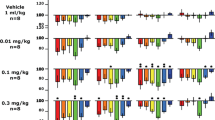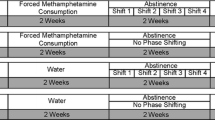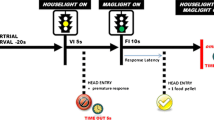Abstract
People suffering of attention-deficit/hyperactivity disorder (ADHD) and treated with the psychostimulant methylphenidate (MPH) show sleep-wake cycle and daily rhythm alterations despite the beneficial effects of MPH on behavioral symptoms (i.e., hyperactivity, attention). In nocturnal rodents (i.e., mice), chronic exposure to MPH alters the neural activity of the circadian clock in the suprachiasmatic nucleus (SCN), behavioral rhythms, and the sleep-wake cycle. Here, we studied the effects of MPH on daily rhythms of behavior and body temperature of the diurnal rodent Arvicanthis ansorgei. Under a light-dark cycle, chronic exposure to MPH in drinking water delayed the onset of both activity and body temperature rhythms. Interestingly, delays were larger when MPH access was restricted to the first 6 h of the light phase (i.e., activity phase) of the 24-h cycle. Since MPH effects are dependent on animal’s fluid intake, in a last experiment, we controlled the time and dose of MPH delivery in Arvicanthis using an intraperitoneal perfusion method. Similarly to the experiment with MPH in drinking water, Arvicanthis showed a delay in the onset of general activity and body temperature when MPH infusions, but not vehicle, were during the first 6 h of the light phase. This study indicates that MPH alters daily rhythms in a time-dependent manner and proposes the use of a diurnal rodent for the study of the effects of MPH on the circadian clock. Knowing the circadian modulation on the effects of MPH in behavior could give new insights in the treatment of ADHD.




Similar content being viewed by others
References
Abarca C, Albrecht U, Spanagel R (2002) Cocaine sensitization and reward are under the influence of circadian genes and rhythm. Proc Natl Acad Sci U S A 99(13):9026–9030. https://doi.org/10.1073/pnas.142039099
Algahim MF, Yang PB, Wilcox VT, Burau KD, Swann AC, Dafny N (2009) Prolonged methylphenidate treatment alters the behavioral diurnal activity pattern of adult male Sprague-Dawley rats. Pharmacol Biochem Behav 92(1):93–99. https://doi.org/10.1016/j.pbb.2008.10.021
Antle MC, van Diepen HC, Deboer T, Pedram P, Pereira RR, Meijer JH (2012) Methylphenidate modifies the motion of the circadian clock. Neuropsychopharmacology 37(11):2446–2455. https://doi.org/10.1038/npp.2012.103
Arnsten AF (2006) Stimulants: therapeutic actions in ADHD. Neuropsychopharmacology 31(11):2376–2383. https://doi.org/10.1038/sj.npp.1301164
Baird AL, Coogan AN, Kaufling J, Barrot M, Thome J (2013) Daily methylphenidate and atomoxetine treatment impacts on clock gene protein expression in the mouse brain. Brain Res 1513:61–71. https://doi.org/10.1016/j.brainres.2013.03.038
Bobrzynska KJ, Mrosovsky N (1998) Phase shifting by novelty-induced running: activity dose-response curves at different circadian times. J Comp Physiol A 182(2):251–258
Boonstra AM, Kooij JJ, Oosterlaan J, Sergeant JA, Buitelaar JK, Van Someren EJ (2007) Hyperactive night and day? Actigraphy studies in adult ADHD: a baseline comparison and the effect of methylphenidate. Sleep 30(4):433–442
Brase DA, Loh HH (1976) The increase in brain tryptophan caused by amphetamine-like drugs: correlation with an increase in body temperature. Life Sci 18(1):115–121
Bush G (2010) Attention-deficit/hyperactivity disorder and attention networks. Neuropsychopharmacology 35(1):278–300. https://doi.org/10.1038/npp.2009.120
Contini V, Rovaris DL, Victor MM, Grevet EH, Rohde LA, Bau CH (2013) Pharmacogenetics of response to methylphenidate in adult patients with attention-deficit/hyperactivity disorder (ADHD): a systematic review. Eur Neuropsychopharmacol 23(6):555–560. https://doi.org/10.1016/j.euroneuro.2012.05.006
Corkum P, Panton R, Ironside S, Macpherson M, Williams T (2008) Acute impact of immediate release methylphenidate administered three times a day on sleep in children with attention-deficit/hyperactivity disorder. J Pediatr Psychol 33(4):368–379. https://doi.org/10.1093/jpepsy/jsm106
Cuesta M, Mendoza J, Clesse D, Pevet P, Challet E (2008) Serotonergic activation potentiates light resetting of the main circadian clock and alters clock gene expression in a diurnal rodent. Exp Neurol 210(2):501–513. https://doi.org/10.1016/j.expneurol.2007.11.026
Dafny N, Yang PB (2006) The role of age, genotype, sex, and route of acute and chronic administration of methylphenidate: a review of its locomotor effects. Brain Res Bull 68(6):393–405. https://doi.org/10.1016/j.brainresbull.2005.10.005
Del Campo N, Chamberlain SR, Sahakian BJ, Robbins TW (2011) The roles of dopamine and noradrenaline in the pathophysiology and treatment of attention-deficit/hyperactivity disorder. Biol Psychiatry 69(12):e145–e157. https://doi.org/10.1016/j.biopsych.2011.02.036
Galland BC, Tripp EG, Taylor BJ (2010) The sleep of children with attention deficit hyperactivity disorder on and off methylphenidate: a matched case-control study. J Sleep Res 19(2):366–373. https://doi.org/10.1111/j.1365-2869.2009.00795.x
Gaytan O, al-Rahim S, Swann A, Dafny N (1997a) Sensitization to locomotor effects of methylphenidate in the rat. Life Sci 61(8):PL101–PL107
Gaytan O, Ghelani D, Martin S, Swann A, Dafny N (1997b) Methylphenidate: diurnal effects on locomotor and stereotypic behavior in the rat. Brain Res 777(1–2):1–12
Gaytan O, Yang P, Swann A, Dafny N (2000) Diurnal differences in sensitization to methylphenidate. Brain Res 864(1):24–39
Gerasimov MR, Franceschi M, Volkow ND, Gifford A, Gatley SJ, Marsteller D, Molina PE, Dewey SL (2000) Comparison between intraperitoneal and oral methylphenidate administration: a microdialysis and locomotor activity study. J Pharmacol Exp Ther 295(1):51–57
Grippo RM, Purohit AM, Zhang Q, Zweifel LS, Guler AD (2017) Direct midbrain dopamine input to the suprachiasmatic nucleus accelerates circadian entrainment. Curr Biol 27:2465–2475.e3. https://doi.org/10.1016/j.cub.2017.06.084
Honma S, Honma K (1992) Locomotor rhythms induced by methylphenidate in suprachiasmatic nuclei-lesioned rats. Neurosci Lett 137(1):24–28
Hubbard J, Ruppert E, Calvel L, Robin-Choteau L, Gropp CM, Allemann C, Reibel S, Sage-Ciocca D, Bourgin P (2015) Arvicanthis ansorgei, a novel model for the study of sleep and waking in diurnal rodents. Sleep 38(6):979–988. https://doi.org/10.5665/sleep.4754
Hut RA, Mrosovsky N, Daan S (1999) Nonphotic entrainment in a diurnal mammal, the European ground squirrel (Spermophilus citellus). J Biol Rhythm 14(5):409–419. https://doi.org/10.1177/074873099129000812
Hutchinson AJ, Ma J, Liu J, Hudson RL, Dubocovich ML (2014) Role of MT1 melatonin receptors in methamphetamine-induced locomotor sensitization in C57BL/6 mice. Psychopharmacology 231(1):257–267. https://doi.org/10.1007/s00213-013-3228-0
Ironside S, Davidson F, Corkum P (2010) Circadian motor activity affected by stimulant medication in children with attention-deficit/hyperactivity disorder. J Sleep Res 19(4):546–551. https://doi.org/10.1111/j.1365-2869.2010.00845.x
Kas MJ, Edgar DM (2001) Scheduled voluntary wheel running activity modulates free-running circadian body temperature rhythms in Octodon degus. J Biol Rhythm 16(1):66–75. https://doi.org/10.1177/074873040101600108
Koda K, Ago Y, Cong Y, Kita Y, Takuma K, Matsuda T (2010) Effects of acute and chronic administration of atomoxetine and methylphenidate on extracellular levels of noradrenaline, dopamine and serotonin in the prefrontal cortex and striatum of mice. J Neurochem 114(1):259–270. https://doi.org/10.1111/j.1471-4159.2010.06750.x
Kuczenski R, Segal DS (2002) Exposure of adolescent rats to oral methylphenidate: preferential effects on extracellular norepinephrine and absence of sensitization and cross-sensitization to methamphetamine. J Neurosci 22(16):7264–7271
Lee MJ, Yang PB, Wilcox VT, Burau KD, Swann AC, Dafny N (2011) Repetitive methylphenidate administration modulates the diurnal behavioral activity pattern of adult female SD rats. J Neural Transm (Vienna) 118(2):285–298. https://doi.org/10.1007/s00702-010-0510-8
Meijer JH, Schwartz WJ (2003) In search of the pathways for light-induced pacemaker resetting in the suprachiasmatic nucleus. J Biol Rhythm 18(3):235–249
Molina-Carballo A, Naranjo-Gomez A, Uberos J, Justicia-Martinez F, Ruiz-Ramos MJ, Cubero-Millan I, Contreras-Chova F, Augustin-Morales MD, Khaldy-Belkadi H, Munoz-Hoyos A (2013) Methylphenidate effects on blood serotonin and melatonin levels may help to synchronise biological rhythms in children with ADHD. J Psychiatr Res 47(3):377–383. https://doi.org/10.1016/j.jpsychires.2012.09.020
Mrosovsky N (1996) Locomotor activity and non-photic influences on circadian clocks. Biol Rev Camb Philos Soc 71(3):343–372
Mrosovsky N, Edelstein K, Hastings MH, Maywood ES (2001) Cycle of period gene expression in a diurnal mammal (Spermophilus tridecemlineatus): implications for nonphotic phase shifting. J Biol Rhythm 16(5):471–478
Novakova M, Paclt I, Ptacek R, Kuzelova H, Hajek I, Sumova A (2011) Salivary melatonin rhythm as a marker of the circadian system in healthy children and those with attention-deficit/hyperactivity disorder. Chronobiol Int 28(7):630–637. https://doi.org/10.3109/07420528.2011.596983
Owens J, Sangal RB, Sutton VK, Bakken R, Allen AJ, Kelsey D (2009) Subjective and objective measures of sleep in children with attention-deficit/hyperactivity disorder. Sleep Med 10(4):446–456. https://doi.org/10.1016/j.sleep.2008.03.013
Pitrosky B, Kirsch R, Malan A, Mocaer E, Pevet P (1999) Organization of rat circadian rhythms during daily infusion of melatonin or S20098, a melatonin agonist. Am J Phys 277(3 Pt 2):R812–R828
Pliszka SR (2005) The neuropsychopharmacology of attention-deficit/hyperactivity disorder. Biol Psychiatry 57(11):1385–1390. https://doi.org/10.1016/j.biopsych.2004.08.026
Renthal W, Nestler EJ (2008) Epigenetic mechanisms in drug addiction. Trends Mol Med 14(8):341–350. https://doi.org/10.1016/j.molmed.2008.06.004
Robinson TE, Becker JB (1986) Enduring changes in brain and behavior produced by chronic amphetamine administration: a review and evaluation of animal models of amphetamine psychosis. Brain Res 396(2):157–198
Sangal RB, Owens J, Allen AJ, Sutton V, Schuh K, Kelsey D (2006) Effects of atomoxetine and methylphenidate on sleep in children with ADHD. Sleep 29(12):1573–1585
Scheel-Kruger J, Hasselager E (1974) Studies of various amphetamines, apomorphine and clonidine on body temperature and brain 5-hydroxytryptamine metabolism in rats. Psychopharmacologia 36(3):189–202
Schwartz G, Amor LB, Grizenko N, Lageix P, Baron C, Boivin DB, Joober R (2004) Actigraphic monitoring during sleep of children with ADHD on methylphenidate and placebo. J Am Acad Child Adolesc Psychiatry 43(10):1276–1282. https://doi.org/10.1097/01.chi.0000135802.94090.93
Sobanski E, Schredl M, Kettler N, Alm B (2008) Sleep in adults with attention deficit hyperactivity disorder (ADHD) before and during treatment with methylphenidate: a controlled polysomnographic study. Sleep 31(3):375–381
Soto PL, Wilcox KM, Zhou Y, Kumar A, Ator NA, Riddle MA, Wong DF, Weed MR (2012) Long-term exposure to oral methylphenidate or dl-amphetamine mixture in peri-adolescent rhesus monkeys: effects on physiology, behavior, and dopamine system development. Neuropsychopharmacology 37(12):2566–2579. https://doi.org/10.1038/npp.2012.119
Sripada S, Gaytan O, Al-rahim S, Swann A, Dafny N (1998) Dose-related effects of MK-801 on acute and chronic methylphenidate administration. Brain Res 814(1–2):78–85
Strother WN, Norman AB, Lehman MN (1998) D1-dopamine receptor binding and tyrosine hydroxylase-immunoreactivity in the fetal and neonatal hamster suprachiasmatic nucleus. Brain Res Dev Brain Res 106(1–2):137–144
Trinh TN, Kohllepel SR, Yang PB, Burau KD, Dafny N (2013) Adult female rats' altered diurnal locomotor activity pattern following chronic methylphenidate treatment. J Neural Transm (Vienna) 120(12):1717–1731. https://doi.org/10.1007/s00702-013-1063-4
Van der Heijden KB, Smits MG, Van Someren EJ, Gunning WB (2005) Idiopathic chronic sleep onset insomnia in attention-deficit/hyperactivity disorder: a circadian rhythm sleep disorder. Chronobiol Int 22(3):559–570. https://doi.org/10.1081/CBI-200062410
van Oosterhout F, Lucassen EA, Houben T, vanderLeest HT, Antle MC, Meijer JH (2012) Amplitude of the SCN clock enhanced by the behavioral activity rhythm. PLoS One 7(6):e39693. https://doi.org/10.1371/journal.pone.0039693
Van Veen MM, Kooij JJ, Boonstra AM, Gordijn MC, Van Someren EJ (2010) Delayed circadian rhythm in adults with attention-deficit/hyperactivity disorder and chronic sleep-onset insomnia. Biol Psychiatry 67(11):1091–1096. https://doi.org/10.1016/j.biopsych.2009.12.032
Volobouev VT, Ducroz JF, Aniskin VM, Britton-Davidian J, Castiglia R, Dobigny G, Granjon L, Lombard M, Corti M, Sicard B, Capanna E (2002) Chromosomal characterization of Arvicanthis species (Rodentia, Murinae) from western and Central Africa: implications for taxonomy. Cytogenet Genome Res 96(1–4):250–260. https://doi.org/10.1159/000063041
Weaver DR, Reppert SM (1995) Definition of the developmental transition from dopaminergic to photic regulation of c-fos gene expression in the rat suprachiasmatic nucleus. Brain Res Mol Brain Res 33(1):136–148
Weiss MD, Gadow K, Wasdell MB (2006) Effectiveness outcomes in attention-deficit/hyperactivity disorder. J Clin Psychiatry 67(Suppl 8):38–45
Welsh DK, Takahashi JS, Kay SA (2010) Suprachiasmatic nucleus: cell autonomy and network properties. Annu Rev Physiol 72:551–577. https://doi.org/10.1146/annurev-physiol-021909-135919
Acknowledgments
This study is supported by the Agence National de la Recherche (ANR-14-CE13-0002-01 ADDiCLOCK JCJC to JM) and the Centre National de la Recherche Scientifique (JM). JHM is supported by TOPGO and Technology Foundation STW, P10-18. We thank Sylviane Gourmelen and Hanan Bouaouda for technical support. Authors declare that they have no conflicts of interest.
Author information
Authors and Affiliations
Corresponding author
Electronic supplementary material
ESM 1
(DOC 345 kb)
Rights and permissions
About this article
Cite this article
Mendoza, J., van Diepen, H.C., Pereira, R.R. et al. Time-shifting effects of methylphenidate on daily rhythms in the diurnal rodent Arvicanthis ansorgei. Psychopharmacology 235, 2323–2333 (2018). https://doi.org/10.1007/s00213-018-4928-2
Received:
Accepted:
Published:
Issue Date:
DOI: https://doi.org/10.1007/s00213-018-4928-2




